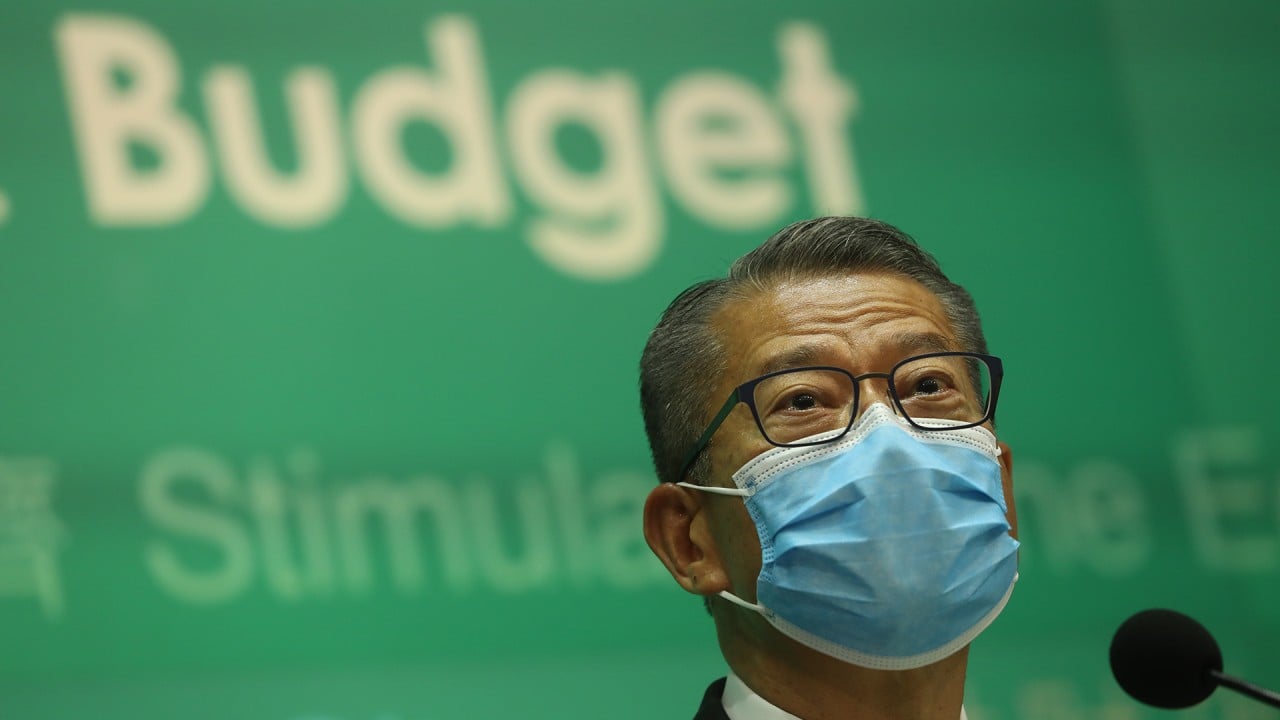
Hong Kong picks AlipayHK, Octopus, Tap & Go and WeChat Pay HK as e-payment providers for HK$5,000 digital voucher scheme, set to launch in summer
- Payment companies to reveal details of the system later so registration can open in the summer holiday, finance chief says
- Digital voucher scheme aims to boost spending by giving every Hong Kong adult resident HK$5,000 in consumption vouchers
Four electronic payment service providers – AlipayHK, Octopus, Tap & Go and WeChat Pay HK – have been chosen to operate Hong Kong’s HK$5,000 (US$643) voucher scheme, which officials plan to launch this summer to boost local spending and accelerate the city’s economic recovery.
The government said on Sunday the providers would look to announce details of the system design as soon as possible so registration for the digital consumption vouchers could open during the summer holiday period.
The scheme, a key policy from Financial Secretary Paul Chan Mo-po’s budget speech in February, will offer every adult Hong Kong resident HK$5,000 in local spending vouchers, benefiting 7.2 million people. It will cost the government an estimated HK$36 billion, of which HK$600 million is for administrative expenses.
“The operators, taking into account their operational model and commercial arrangements, will give back the additional income generated from the consumption vouchers to merchants or consumers by various means,” Chan said on Sunday. “They will also organise different promotional events to encourage consumption.”
He said the operators currently cover a network of about 30,000 to 100,000 merchants in retail, food and drink, and service industries.
They have agreed to waive their fees for processing payments incurred from the consumption vouchers to motivate more businesses to join the scheme, according to Chan.
“When identifying the operators, the government has taken into consideration a basket of factors, including the popularity, ease of use, and coverage of merchants of the operators, the operator’s relevant experience and supporting facilities, and the preparation time required,” he said.
Hong Kong’s economy shrank by 6.1 per cent last year – the biggest annual contraction on record – as the coronavirus pandemic hammered key drivers of growth such as tourism and consumption.
The scheme is expected to give the economy a 0.7 percentage-point boost, according to Chan.
The minister said the government would set up a central registration system under which Hongkongers would be required to sign up through one of the four payment providers.
People who registered for the government’s HK$10,000 cash handout last year would, for convenience, have their personal details automatically filled in when applying for the voucher scheme, Chan said.
He said a further announcement would be made on details such as the value of instalments and over what time period the vouchers would be distributed.
“The principle is to allow the coupons to be spent with flexibility,” he said.
Octopus has promised to exempt new and eligible merchants – particularly small and medium ones – from set-up costs or rental fees associated with installing its payment readers, and said it would redistribute the extra income from the voucher scheme to users or merchants in various ways.
The operator – used by up to 98 per cent of the city’s 7.5 million population as well as 62,000 retail and food and drink outlets – also said those who signed up for its business app would not have to pay fees for transferring funds to banks in the scheme.

Alipay – which has 2.7 million active users and some 100,000 merchants in Hong Kong – said the company would rebate its income from the voucher scheme to participating consumers and businesses. Alipay is owned by Ant Group, an affiliate of Alibaba Group Holding, the owner of the South China Morning Post.
“The government’s distribution of spending coupons through digital wallets will help accelerate the popularisation and development of mobile payments, and is a milestone in promoting the development of smart cities in Hong Kong,” an Alipay spokeswoman said.
WeChat Pay HK, which has more than 3.8 million registered users and 90,000 merchants, including those in wet markets, said it would aim to increase the number of small- and medium-sized merchants on its books.
“Looking ahead, we will continue to collaborate with different stakeholders to foster the development of mobile payment in Hong Kong, enabling more users to enjoy a secure and convenient mobile payment service,” said Daniel Hong, vice-president of Tencent Financial Technology, which operates WeChat Pay HK.
Joe Chau Kwok-ming, honourable life president of the Hong Kong General Chamber of Small and Medium Business, said it was good news that the digital payment service providers offered incentives for small businesses to join the scheme.
“We want to see wider participation from small- and medium-sized merchants in electronic payments, which is the city’s way forward,” he said. “The voucher scheme will give a shot in the arm for their development in this area.”
He urged the government to roll out user-friendly arrangements for the voucher scheme and take lessons from a similar initiative Macau rolled out in the past year.
Last year, the casino hub launched a 2.2 billion patacas (US$274.9 million) worth of vouchers, or 3,000 patacas per permanent resident, to boost consumption.
Macau residents last month erupted against a new round of e-voucher scheme worth another 5 billion patacas in total or 5,000 patacas per person, including non-permanent residents, with critics saying the scheme was complicated and confusing. The outcry resulted in a delay of the scheme’s roll-out from May to June or beyond.


